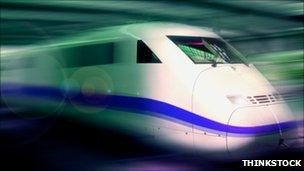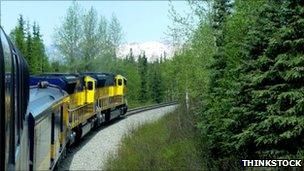How loud will the new high-speed train be?
- Published

The proposed high-speed train will reach speeds of 250mph
The government is attempting to reassure people over the noise levels from the planned HS2 high-speed trains. But how loud are these trains and what can be done to mitigate the noise?
Powerful trains have long barrelled down tracks blowing their horns. But faster lines mean louder trains.
It is thought that around 4,860 homes in England will experience extra noise as a result of the proposed train line, according to a study by the Department for Transport. An estimated 10 properties will suffer from high noise levels and another 150 will need noise insulation.
So just how loud will the proposed trains be?
The government is yet to indicate the volume level, but according to the Telegraph, external, the Department for Transport has hired engineering firm Arup to demonstrate the noise to concerned members of the public.
A simulation of the train's noise when it passes through various points can be heard through headphones at a series of roadshows.
The simulated sound has been created by using a recording of the 217mph high-speed trains in France and then adjusting the sound to take into account Britain's potentially even faster trains. The government believes 250mph trains could be available by 2020.
The recording is tweaked to take into account the ambient sounds from various locations along the route.
Despite an absence of official numbers, the chairwoman of the Stop HS2 group, Lizzy Williams, estimates at 50m from the track, the noise from the trains will be "between 95 and 97 decibels every two minutes if the line runs at capacity".
But speed isn't the only determinant of train noise. How bothersome the noise is depends on the pitch and the quality of the sound, says Royal Academy of Engineering network rail research professor Roderick Smith.
"A freight train on a poorly maintained track will create a lot more noise for a longer time," he explains.
In Germany, residents have long been used to hearing high-speed Deutsche Bahn trains.
"We don't see very many complaints when it comes to the noise of the high speed lines, but we see a number or complaints about the noise of the freight transport lines," a spokesman says.
At 25m from the track the 85-decibel noise of their 155mph high-speed train is mitigated by noise reduction measures mandated by law.
Though attempts will be made to manage the noise in the UK, the chairman of VoxOpp (Villages of Oxfordshire Opposing HS2), Bernie Douglas, says concrete plans have yet to be released.
But there is already speculation about the tactics the government might employ to reduce the potential noise pollution.
"You can build big earth ramparts and you can also put brown picket fences that are about 5m high," says Mr Douglas.
An even better option is planting trees, which look more natural and also absorb carbon dioxide, says Prof Smith.
But it's debatable whether the more natural options, though aesthetically pleasing, are as effective in masking the sounds.

It's debatable whether or not trees help mitigate sound from trains
"From what we understand trees do not have much impact on noise. They could be used to hide a lot of the features, but that's all they might be used for," says Douglas.
There are two principal sources of the noise that comes from trains - the interaction of the wheels and the rails, and the aerodynamic noise of the train passing through the air very quickly, explains Prof Smith.
"Broadly speaking these trains are no worse than the noise from a highway and generally more acceptable in that the noise is not continuous, whereas the noise from a highway is a constant buzz throughout the day and often throughout the night as well.
"I'm not saying these trains are completely soundless and won't cause some sort of disruption, but it can be managed and it can be managed rather easily."